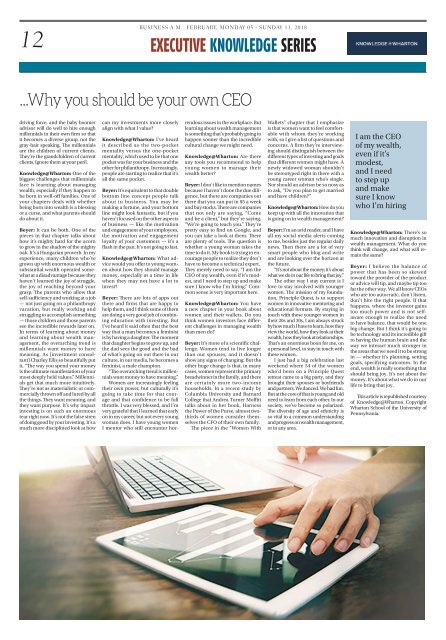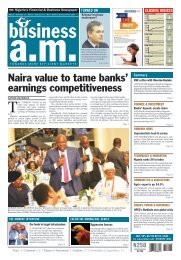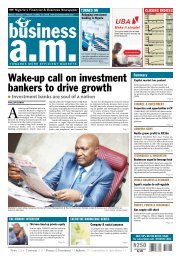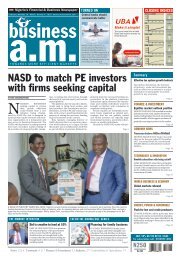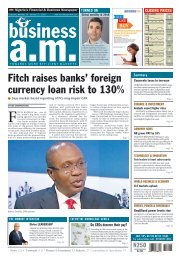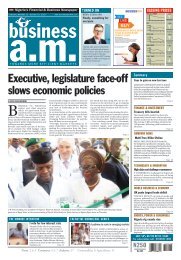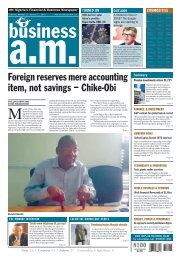You also want an ePaper? Increase the reach of your titles
YUMPU automatically turns print PDFs into web optimized ePapers that Google loves.
12<br />
BUSINESS A.M. FEBRUARY, MONDAY <strong>05</strong> - SUNDAY 11, 20<strong>18</strong><br />
EXECUTIVE KNOWLEDGE SERIES<br />
...Why you should be your own CEO<br />
driving force, and the baby boomer<br />
advisor will do well to hire enough<br />
millennials in their own firm so that<br />
it becomes a diverse group, not the<br />
gray-hair speaking. The millennials<br />
are the children of current clients.<br />
They’re the grandchildren of current<br />
clients. Ignore them at your peril.<br />
Knowledge@Wharton: One of the<br />
biggest challenges that millennials<br />
face is learning about managing<br />
wealth, especially if they happen to<br />
be born in well-off families. One of<br />
your chapters deals with whether<br />
being born into wealth is a blessing<br />
or a curse, and what parents should<br />
do about it.<br />
Beyer: It can be both. One of the<br />
pieces in that chapter talks about<br />
how it’s mighty hard for the acorn<br />
to grow in the shadow of the mighty<br />
oak. It’s a Hungarian proverb. In my<br />
experience, many children who’ve<br />
grown up with enormous wealth or<br />
substantial wealth operated somewhat<br />
at a disadvantage because they<br />
haven’t learned the joy of struggle,<br />
the joy of reaching beyond your<br />
grasp. The parents who allow that<br />
self-sufficiency and working at a job<br />
— not just going on a philanthropy<br />
vacation, but really working and<br />
struggling to accomplish something<br />
— those children and those parents<br />
see the incredible rewards later on.<br />
In terms of learning about money<br />
and learning about wealth management,<br />
the overarching trend is<br />
millennials want money to have<br />
meaning. As (investment consultant)<br />
Charley Ellis so beautifully put<br />
it, “The way you spend your money<br />
is the ultimate manifestation of your<br />
most deeply held values.” Millennials<br />
get that much more intuitively.<br />
They’re not as materialistic or commercially<br />
thrown off and lured by all<br />
the things. They want meaning, and<br />
they want purpose. It’s why impact<br />
investing is on such an enormous<br />
tear right now. It’s not the false siren<br />
of doing good by your investing. It’s a<br />
much more disciplined look at how<br />
can my investments more closely<br />
align with what I value?<br />
Knowledge@Wharton: I’ve heard<br />
it described as the two-pocket<br />
mentality versus the one-pocket<br />
mentality, which used to be that one<br />
pocket was for your business and the<br />
other for philanthropy. Increasingly,<br />
people are starting to realize that it’s<br />
all the same pocket.<br />
Beyer: It’s equivalent to that double<br />
bottom line concept people talk<br />
about in business. You may be<br />
making a fortune, and your bottom<br />
line might look fantastic, but if you<br />
haven’t focused on the other aspects<br />
of business — like the motivation<br />
and engagement of your employees,<br />
the motivation and engagement<br />
loyalty of your customers — it’s a<br />
flash in the pan. It’s not going to last.<br />
Knowledge@Wharton: What advice<br />
would you offer to young women<br />
about how they should manage<br />
money, especially at a time in life<br />
when they may not have a lot to<br />
invest?<br />
Beyer: There are lots of apps out<br />
there and firms that are happy to<br />
help them, and I think some of them<br />
are doing a very good job of combining<br />
education with investing. But<br />
I’ve heard it said often that the best<br />
way that a man becomes a feminist<br />
is by having a daughter. The moment<br />
that daughter begins to grow up, and<br />
the dad sees the good and the bad<br />
of what’s going on out there in our<br />
culture, in our media, he becomes a<br />
feminist, a male champion.<br />
“The overarching trend is millennials<br />
want money to have meaning.”<br />
Women are increasingly feeling<br />
their own power, but culturally it’s<br />
going to take time for that courage<br />
and that confidence to be full<br />
throttle. I was very blessed, and I’m<br />
very grateful that I learned that early<br />
on in my career, but not every young<br />
woman does. I have young women<br />
I mentor who still encounter horrendous<br />
issues in the workplace. But<br />
learning about wealth management<br />
is something that’s probably going to<br />
happen sooner than the incredible<br />
cultural change we might need.<br />
Knowledge@Wharton: Are there<br />
any tools you recommend to help<br />
young women to manage their<br />
wealth better?<br />
Beyer: I don’t like to mention names<br />
because I haven’t done the due diligence,<br />
but there are companies out<br />
there that you can put in $5 a week<br />
and buy stocks. There are companies<br />
that not only are saying, “Come<br />
and be a client,” but they’re saying,<br />
“We’re going to teach you.” They’re<br />
pretty easy to find on Google, and<br />
you can take a look at them. There<br />
are plenty of tools. The question is<br />
whether a young woman takes the<br />
time to do it. My book is trying to encourage<br />
people to realize they don’t<br />
have to become a technical expert.<br />
They merely need to say, “I am the<br />
CEO of my wealth, even if it’s modest,<br />
and I need to step up and make<br />
sure I know who I’m hiring.” Common<br />
sense is very important here.<br />
Knowledge@Wharton: You have<br />
a new chapter in your book about<br />
women and their wallets. Do you<br />
think women investors face different<br />
challenges in managing wealth<br />
than men do?<br />
Beyer: It’s more of a scientific challenge.<br />
Women tend to live longer<br />
than our spouses, and it doesn’t<br />
show any signs of changing. But the<br />
other huge change is that, in many<br />
cases, women represent the primary<br />
breadwinner in the family, and there<br />
are certainly more two-income<br />
households. In a recent study by<br />
Columbia University and Barnard<br />
College that Andrea Turner Moffitt<br />
talks about in her book, Harness<br />
the Power of the Purse, almost twothirds<br />
of women consider themselves<br />
the CFO of their own family.<br />
The piece in the “Women With<br />
Wallets” chapter that I emphasize<br />
is that women want to feel comfortable<br />
with whom they’re working<br />
with, so I give a list of questions and<br />
concerns. A firm they’re interviewing<br />
should distinguish between the<br />
different types of investing and goals<br />
that different women might have. A<br />
newly widowed woman shouldn’t<br />
be stereotyped right in there with a<br />
young career woman who’s single.<br />
Nor should an advisor be so nosy as<br />
to ask, “Do you plan to get married<br />
and have children?”<br />
Knowledge@Wharton: How do you<br />
keep up with all the innovation that<br />
is going on in wealth management?<br />
Beyer: I’m an avid reader, and I have<br />
all my social media alerts coming<br />
to me, besides just the regular daily<br />
news. Then there are a lot of very<br />
smart people who blog and write<br />
and are looking over the horizon at<br />
the future.<br />
“It’s not about the money; it’s about<br />
what we do in our life to bring that joy.”<br />
The other way I stay current is I<br />
love to stay involved with younger<br />
women. The mission of my foundation,<br />
Principle Quest, is to support<br />
women in innovative mentoring and<br />
educational formats. By staying in<br />
touch with these younger women in<br />
their 20s and 30s, I am always struck<br />
by how much I have to learn, how they<br />
view the world, how they look at their<br />
wealth, how they look at relationships.<br />
That’s an enormous boon for me, on<br />
a personal level, to stay in touch with<br />
these women.<br />
I just had a big celebration last<br />
weekend where 54 of the women<br />
who’d been on a Principle Quest<br />
retreat came to a big party, and they<br />
brought their spouses or boyfriends<br />
and partners. We danced. We had fun.<br />
But at the core of that is young and old<br />
need to learn from each other. In our<br />
society, we’ve become so polarized.<br />
The diversity of age and ethnicity is<br />
so vital to a common understanding<br />
and progress on wealth management,<br />
or in any area.<br />
I am the CEO<br />
of my wealth,<br />
even if it’s<br />
modest,<br />
and I need<br />
to step up<br />
and make<br />
sure I know<br />
who I’m hiring<br />
Knowledge@Wharton: There’s so<br />
much innovation and disruption in<br />
wealth management. What do you<br />
think will change, and what will remain<br />
the same?<br />
Beyer: I believe the balance of<br />
power that has been so skewed<br />
toward the provider of the product<br />
or advice will tip, and maybe tip too<br />
far the other way. We all know CEOs<br />
who are too autocratic, don’t listen,<br />
don’t hire the right people. If that<br />
happens, where the investor gains<br />
too much power and is not selfaware<br />
enough to realize the need<br />
to have balance, that would be one<br />
big change. But I think it’s going to<br />
be technology and its incredible gift<br />
to having the human brain and the<br />
way we interact much stronger in<br />
the areas that we need it to be strong<br />
in — whether it’s planning, setting<br />
goals, specifying outcomes. In the<br />
end, wealth is really something that<br />
should bring joy. It’s not about the<br />
money. It’s about what we do in our<br />
life to bring that joy.<br />
This article is republished courtesy<br />
of Knowledge@Wharton. Copyright<br />
Wharton School of the University of<br />
Pennsylvania.


